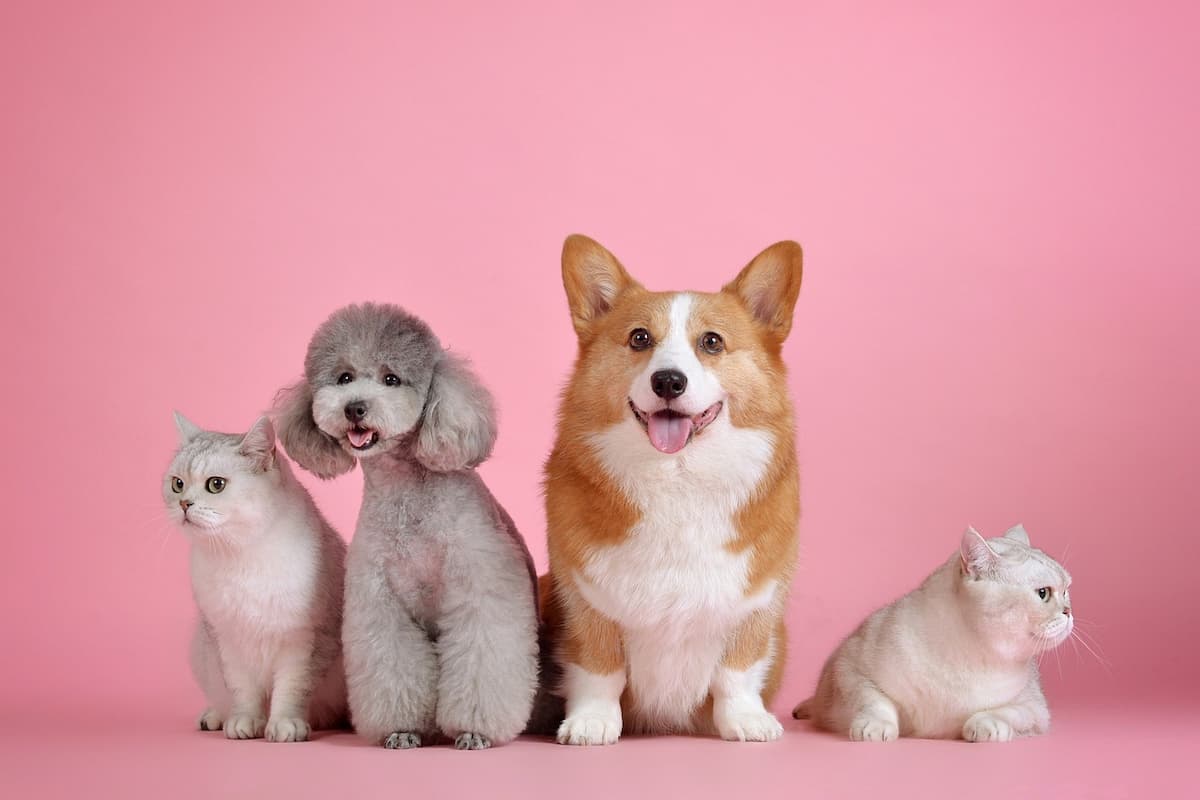Ah, dogs.
The faithful companions that never cease to amaze us with their nose for trouble and uncanny ability to find the most obscure snacks.
One particular culinary delight they seem to relish, much to the disgust of their owners, is none other than cat poop fresh off the litter box.
Yes, you read that right – those mysterious brown morsels that we frown upon are often a prime target for our beloved canines.
But why on earth would our furry friends be so irresistibly drawn to such an unappetizing treat?
Read on to find the gross answers.
Why Do Dogs Find Cat Poop So Irresistible?
Have you ever caught your furry friend gobbling up cat poop straight from the litter box?
You might find yourself disgusted and bewildered by this peculiar behavior.
Rest assured, you’re not alone. Many dog owners wonder why their beloved pets show such fascination with the litter box.
Here are some fascinating (if disgusting) reasons for this puzzling habit:
One possible explanation is the strong olfactory appeal of cat feces.
Cats have a high-protein diet, and their waste contains undigested protein compounds that can be quite attractive to dogs.
Additionally, cat poop has a distinct smell that dogs are simply wired to find appealing.
Their keen sense of smell allows them to detect scents that are undetectable to humans, so what may seem repulsive to us is like a tantalizing treat to our canine companions.
But it’s not just the smell that lures dogs towards the litter box.
Dogs are natural scavengers, and their tendency to eat a variety of things, including feces, originates from their evolution as opportunistic hunters.
In the wild, dogs would have consumed the waste of other animals for both nutritional and territorial reasons.
While domesticated dogs may not have the same imperative, this behavior can still be ingrained in their instinctual nature.
Another reason dogs find the litter box alluring is because of their innate curiosity.
The litter box is like a secret chamber that captivates their inquisitive minds.
Curiosity can sometimes lead to inappropriate behavior, such as indulging in snacks that are less than desirable.
And if they see that munching on cat poop gets them a reaction from their owners, even if it’s negative, they might continue the behavior to gain attention.
It’s important to remember that dogs can’t comprehend the concept of cleanliness and hygiene the way humans do.
To them, the litter box is an intriguing place that holds mysterious objects, intriguing smells, and potential tasty treats.
Lastly, one reason behind this unsettling habit lies in your dog’s natural instinct as a pack animal.
Dogs have a hierarchical structure within their packs, and they see themselves as either above or below other members, including humans.
By consuming the feces of another animal, such as a cat, a dog may be instinctively trying to exert dominance and exert control over its surroundings.
They may view the behavior as a way to assert their rank or claim the territory belonging to the cat.
It’s an unusual way for dogs to mark their own scent and demonstrate their authority, but in their canine logic, it somehow makes sense.
Is It Just a Quirk or a Cause for Concern?
It’s important to note that while eating cat poop may be a quirky behavior for your furry friend, it can also pose some risks.
Cat feces may contain parasites, such as Toxoplasma gondii, which can be harmful to both dogs and humans if ingested.
To protect your dog’s health, it’s advisable to prevent them from accessing the litter box or promptly cleaning it to minimize the risk of contamination.
If you find this habit persists despite your best efforts, consulting with a veterinarian is always a wise choice.
They can provide guidance on discouraging this behavior and ensure that your four-legged companion remains in optimal health.
Remember, while it may be puzzling why Fido fancies feline feces, maintaining their wellbeing is the ultimate priority!
Tips to Prevent Your Dog from Eating Cat Poop
While coprophagia is generally harmless, it’s important to discourage this behavior for various reasons.
Firstly, not only is it unhygienic and unsightly, but it can also lead to potential health issues for your dog, such as intestinal parasites or an upset stomach.
Additionally, eating cat poop can create tension between your dog and cat, affecting their relationship and overall household harmony.
So, let’s explore some tactics to prevent this behavior and keep our homes safe and clean:
Keep the litter box inaccessible: Place the litter box in a location that is off-limits to your dog, such as in a separate room with a door or behind a baby gate.
This will prevent them from having easy access to their favorite snack.
Supervise outdoor time: If your cat goes outside to do their business, make sure you accompany your dog and keep a close eye on them.
This way, you can redirect their attention if they attempt to indulge in cat poop found in the yard.
Proper diet and nutrition: Ensure your dog is receiving a well-balanced diet that meets their nutritional needs.
Consult with your veterinarian to determine if any dietary changes or supplements are necessary to address potential deficiencies.
While it may take some time and patience, implementing these tips can help minimize the risk of your dog feasting on cat poop.
Remember, it’s essential to provide them with alternative activities and plenty of positive reinforcement to discourage this behavior.
With consistent training and a watchful eye, you’ll soon keep your pup’s curious palate far away from the litter box!
FAQ
Q: Why on earth do dogs indulge in such an unappetizing feast?
A: Well, our canine companions have an incredibly strong scent detection ability, and cat feces carry a distinct aroma that dogs find intriguing.
To them, that litter box might just be an all-you-can-eat buffet, no matter how repulsive it may seem to us humans.
Q: But, seriously, is there any nutritional value in cat poop for dogs?
A: Surprisingly, no, not really.
While dogs may perceive it as a delicious treat, cat feces generally lack any substantial nutritional content.
In fact, a dog’s regular diet usually provides them with all the nutrients they need, so they’re not eating cat poop out of necessity.
Q: Could there be any underlying medical issues causing this behavior?
A: In some cases, dogs that constantly raid the litter box might have underlying health issues.
These can range from enzyme deficiencies to malnutrition or dietary imbalances.
If you notice your furry friend’s obsession becoming excessive or harmful, it’s best to consult your veterinarian for further evaluation.
Q: Is eating cat poop harmful to my dog’s health?
A: Eating a little bit of cat poop now and then is unlikely to cause significant harm.
However, it’s important to keep an eye out for potential consequences.
Cat feces may contain parasites or bacteria that could negatively affect your dog’s health, especially if consumed in large quantities.
Regular worming of your cat and keeping the litter box clean can help minimize these risks.
Q: How can I prevent my dog from eating cat’s poop habit?
A: Handling the poop predicament may require some creative measures.
Start by making the litter box inaccessible to your pooch.
Placing it in an elevated or closed area with a small entrance that only your cat can navigate can be a good solution.
Additionally, training your dog to stay away from the litter box or providing them with a tempting alternative, like chew toys, can help redirect their attention.
Just stay vigilant, take necessary preventive measures, and enjoy the endless adventures with your canine companion – even if they occasionally indulge in some questionable culinary delights!
Last Words
From their evolutionary roots as scavengers to their never-ending quest for delicious snacks, our canine companions just can’t resist the allure of feline feces.
But before you start feeling disgusted or worried about your pup’s peculiar dietary preferences, remember that this behavior, although not exactly desirable, is relatively common among our four-legged friends.
It’s important to keep in mind that dogs aren’t the only “culprits” when it comes to strange eating habits.
Just like humans have their quirks, dogs have theirs too, no matter how gross they may seem to us.
If you’re a dog owner facing this issue, fear not!
There are steps you can take to discourage your furry pal from turning to the litter box for a quick snack.
Try keeping your cat’s litter box in a separate room with a door or gate that only allows the cat access.
This way, you can create a physical barrier that prevents your pup from indulging in their favorite “poopy popsicles.”
Additionally, make sure your pup’s diet is complete and nutritionally balanced.
Sometimes, dogs will eat cat poop because they are lacking certain nutrients in their own diet.
By providing them with a high-quality dog food and consulting with your veterinarian, you can ensure their nutritional needs are properly met.
Although this may be a somewhat awkward and unpleasant topic to discuss, understanding why dogs eat cat poop is crucial for responsible pet ownership.
By learning about our furry friends’ behaviors, we can make informed decisions to keep them happy, healthy, and free from engaging in undesirable snacking habits.












